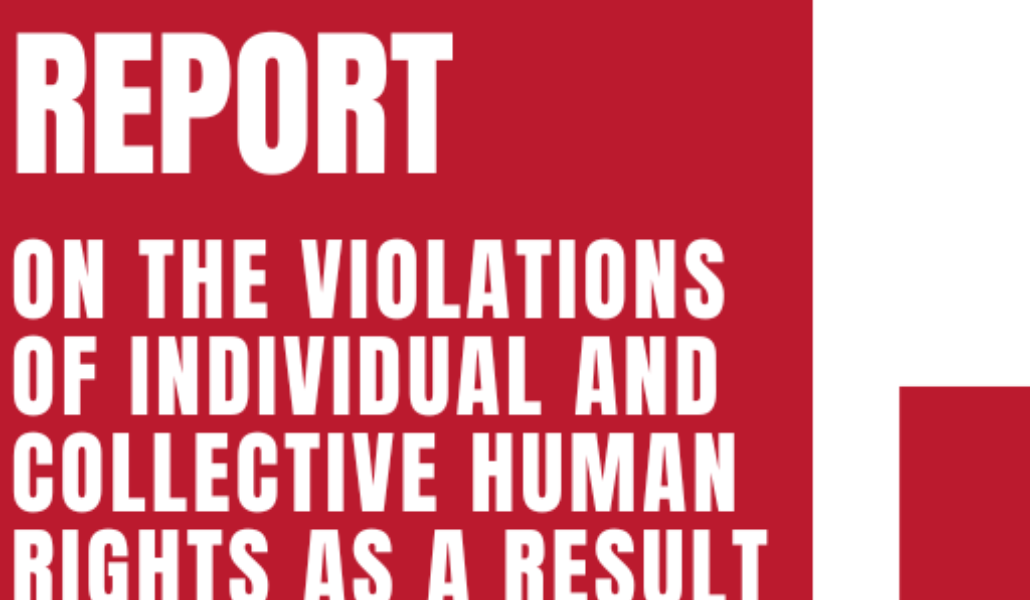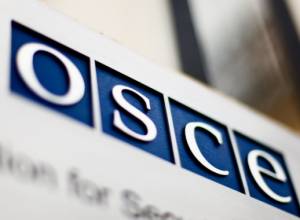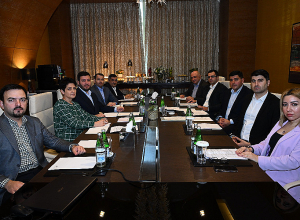
The Updated Report of the Human Rights Defender on Violations of Individual and Collective Human Rights as a Result of the Blockade of Artsakh by Azerbaijan Has
Support A1+!The Updated Report (with data from 4 months of the blockade) of the Human Rights Defender on Violations of Individual and Collective Human Rights as a Result of the Blockade of Artsakh by Azerbaijan Has Been Published
On April 12, the Human Rights Defender of the Republic of Artsakh published an updated version of the ad hoc trilingual report on the violations of individual and collective human rights as a result of the 122-day blockade of Artsakh by Azerbaijan.
The report comprehensively and in detail presents data on the violations of 7 individual rights, 5 rights of vulnerable groups and 4 collective rights, which reflect the deepening humanitarian crisis and the genocidal policy of Azerbaijan towards the people of Artsakh.
The continuous blockade by Azerbaijan, disruption of the operation of vital infrastructure, as well as regularly and consistently carried out armed attacks and threats of use of force are aimed at subjecting Artsakh to ethnic cleansing and destroying the indigenous Armenian population of Artsakh by physical and psychological terror and creation of unbearable living conditions.
Below are presented some basic data reflected in the Report on human rights violations as a result of the 122-day blockade:
• The movement of people passing through the Stepanakert-Goris highway (along the Lachin corridor) has decreased by about 183 times (1,638 entries and departures instead of 298,900);
• Almost 48 times less car traffic was recorded on the road compared to what should have been in case of no blockade (2,362 car entries and departures, performed only by the Red Cross and Russian peacekeepers, instead of 112,240);
• Approximately 12 times less vital cargo was imported compared to what should have been in case of no blockade (4,089 tons instead of 48,800 tons);
• A total of about 3,900 people, including 570 children, were unable to return to their homes due to the blockade;
• Due to the suspension of the pre-planned operations, about 1060 citizens lost the opportunity to solve their health problems via operations;
• Azerbaijan has completely or partially interrupted the gas supply from Armenia to Artsakh for a total of 56 days;
• The electricity supply from Armenia to Artsakh has been completely cut for 93 days now, which led to the introduction rolling blackouts followed by numerous accidents;
• According to preliminary estimates, about 10,300 people have actually lost their jobs and sources of income (including cases of job retention), which is more than 50% of the total number of private sector employees;
• The disruption of the gas and electricity supplies has led to unplanned deforestation – about 7,400 more trees were cut, which, in its turn, will create additional and long-term problems in terms of ensuring a healthy environment;
• The country's economy suffered loss in the amount of about USD 230 million
• The construction of 32.6 km road, tens of kilometers of water pipeline, irrigation systems for thousands of hectares of land, 3,717 appartments, more than 40 social and industrial infrastructural facilities has been stopped;
• A number of violations of rights are more pronounced in case of vulnerable groups, in particular 30,000 children, 9,000 people with disabilities, 20,000 older people, 60,000 women (women and girls) and 15,000 displaced persons.
In addition to the continuous and multiple violations of the provisions of the Tripartite Statement of November 9, 2020, for 50 consecutive days now, the mandatory execution of the decision of the International Court of Justice (ICJ) of the United Nations (UN) on ensuring unhindered entry and departure of people, cars and cargo along the Lachin corridor has not been implemented by Azerbaijan, which once again tramples on the highest international values and principles. Consequently, the international community has not only the right, but also an indisputable obligation to implement the decision of the Supreme International Court of Justice by practical means as soon as possible and to prevent future Azerbaijani crimes, including the new planned and brutal crime against humanity.
All the violations of Azerbaijan against the people of Artsakh are carried out within the framework of its state policy of racial discrimination (Armenophobia) and are deeply directed against their right to self-determination and the fact of its realisation, aimed at finally resolving the conflict to their advantage via ethnic cleansing based on the “no people, no rights” logic.
The systematic and consistent policy of ethnic hatred pursued by Azerbaijan, which manifested itself both during the aggression against the people of Artsakh in 2020 and after the establishment of the ceasefire regime, indisputably proves that any status of Artsakh within Azerbaijan is tantamount to ethnic cleansing of Artsakh and the genocide of the Armenians of Artsakh. Therefore, in the context of the Artsakh conflict, the right to self-determination is equal to the right of people to live in their homeland.
The fundamental right to self-determination of the people of Artsakh, as well as the Azerbaijani encroachments and threats against their physical existence on the basis of racial discrimination are more than sufficient grounds for the protection of the people of Artsakh by the international community, as well as the international recognition of the Republic of Artsakh based on the principle of “remedial recognition”. The report is available at the following link: https://artsakhombuds.am/en/document/1013.



